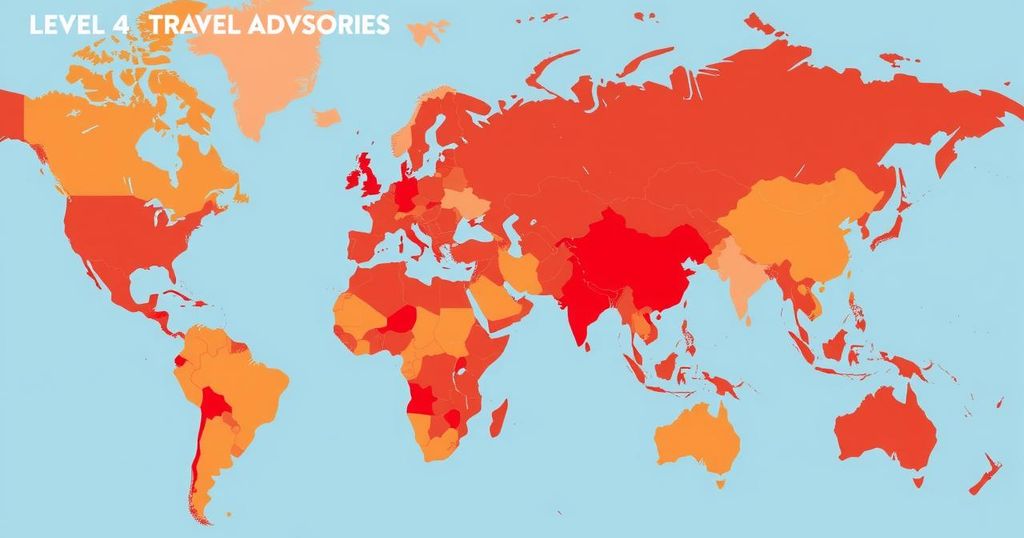The U.S. Department of State has issued Level 4 travel advisories for numerous countries including Afghanistan, Venezuela, and Lebanon among others, due to escalating violence and political instability. These advisories serve as warnings against travel, urging Americans to reconsider plans to visit these regions known for heightened dangers. Travelers are urged to stay informed and prioritize safety when planning trips to such destinations.
The U.S. Department of State has updated travel advisories for numerous destinations, primarily affecting popular spring break locations across Latin America and the Caribbean. Countries including Russia, Jamaica, Colombia, Belarus, Yemen, Syria, and several others are now assigned Level 4 advisories, indicating a strong warning against travel due to escalating crime, political instability, and violence.
These advisories are particularly significant as they reflect an alarming increase in violent crime, including kidnappings and civil unrest, which poses risks to both travelers and locals. The shift in travel perceptions comes at a time when these regions had been famed for their rich culture and appealing tourism opportunities, now overshadowed by rising security concerns.
A travel advisory indicates safety risks, categorized on a scale where Level 4 signifies the most severe concerns. Such warnings are issued when conflicts, instability, or extreme conditions threaten travelers’ safety. Travelers are advised to reconsider plans to visit these destinations, as conditions can be dangerous and unpredictable.
Countries like Afghanistan continue to face severe dangers due to ongoing conflict and instability, particularly with the resurgence of the Taliban. The risk of violence, including armed attacks and kidnappings, remains high, suggesting American citizens refrain from travel.
The Democratic Republic of the Congo (DRC) also experiences significant violence from armed militias, coupled with healthcare deficiencies, putting travelers at considerable risk. The ongoing unrest and infrastructure weaknesses highlight the need for caution.
In Lebanon, political instability and economic crises contribute to an unsafe environment. The presence of protests and an increased risk of terrorism, particularly near conflict-ridden borders, warrant a high level of caution from travelers.
The Central African Republic (CAR) faces ongoing violence and a high risk of abductions due to armed conflicts. The U.S. strongly discourages travel here as conditions pose remarkable risks to safety.
Belarus has been marked by political repression under a dictatorial regime, with frequent protests and intimidation of dissenters. Such conditions present substantial risks for traveling U.S. citizens.
Iraq remains dangerous due to the continued presence of militant groups, while the conflict in Ukraine extends significant risk to travelers amidst active combat zones. U.S. citizens are advised against travel to these nations until the security landscape improves.
In Venezuela, the humanitarian crisis and political upheaval, marked by significant crime activity, deter safe travel. Haiti struggles against gang violence and widespread political instability, resulting in serious risks for American tourists.
In Iran, political unrest has led to heightened risks of detention for foreign nationals, prompting ongoing advisories against travel.
The multitude of countries currently receiving Level 4 advisories illustrates widespread alarm about travelers’ safety, primarily due to conflicts and violence. Some travelers may still attempt visits despite the risks, highlighting the gap between advisory communications and traveler awareness.
To address potential dangers, travelers are encouraged to stay informed using the U.S. Department of State’s resources, enroll in emergency programs, and maintain connections with local embassies while considering their safety when traveling to these regions.
The implications of these travel advisories on the travel industry are profound. Airlines and tour operators must adapt to these changing conditions, ensuring they provide up-to-date information to travelers. Increased demand for travel insurance that covers emergencies and evacuations is anticipated.
The U.S. travel advisory system utilizes various safety assessment factors such as crime rates and political stability to determine advisories. Despite the risks associated with these destinations, the allure of spring break tourism is expected to persist as many vacationers remain unaware of potential dangers.
As spring break nears, U.S. travelers should acknowledge the rising security risks in various Latin American and Caribbean destinations. The issuance of Level 3 and Level 4 travel advisories underscores the importance of traveler safety and informed planning. Adaptations within the travel industry will likely ensue, and tourists are advised to remain cautious and well-informed to ensure safe travel experiences.
Original Source: www.travelandtourworld.com




